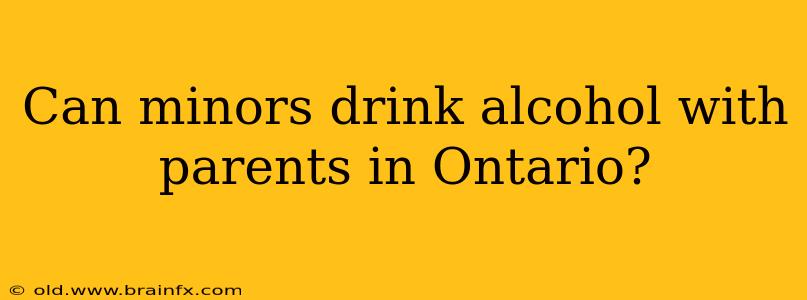The question of whether minors can drink alcohol with their parents in Ontario is a complex one, often leading to confusion. While the legal drinking age in Ontario is 19, there are nuances to the law that allow for some exceptions. This guide clarifies the legal framework surrounding underage alcohol consumption in Ontario, providing a comprehensive overview for parents and young people alike.
The Legal Drinking Age in Ontario: 19
It's crucial to understand the fundamental rule: the legal drinking age in Ontario is 19 years old. This means that purchasing, possessing, or consuming alcohol is illegal for anyone under the age of 19. This applies regardless of parental consent or supervision.
Exceptions and Grey Areas: The "Private Place" Clause
The Liquor Licence Act of Ontario contains a provision that creates some ambiguity. While it prohibits providing alcohol to minors, it also mentions that the law doesn't apply to consumption in a "private place" under the supervision of a parent or guardian.
This "private place" clause is the source of much confusion. It doesn't grant blanket permission for underage drinking. The key elements are:
- Private Place: This refers to a dwelling-house, not a public space like a restaurant or park.
- Supervision: The parent or guardian must be actively supervising the minor's consumption. This means being present and aware of the amount consumed. Simply being in the same house isn't sufficient.
- Responsible Consumption: The intention is not to encourage excessive drinking, but rather allow for moderate, supervised consumption in a controlled family setting.
What Constitutes "Responsible Supervision"?
The concept of "responsible supervision" is crucial and often subjective. It implies:
- Limiting Quantity: Parents should restrict the amount of alcohol the minor consumes.
- Monitoring Behaviour: Parents must be attentive to the minor's behaviour and intervene if necessary.
- Setting Limits: Clear rules and boundaries regarding alcohol consumption should be established.
- Education: Open communication about alcohol's effects and responsible consumption is essential.
Potential Consequences of Violating the Law
Even within the "private place" context, there are potential legal ramifications if the situation escalates. If a minor becomes intoxicated or engages in illegal or dangerous behaviour, parents could face charges related to providing alcohol to a minor or failing to supervise adequately. The penalties can range from fines to more serious consequences.
Recommendations for Parents
The most responsible approach is to delay alcohol consumption until the legal age of 19. While the "private place" clause exists, it's not a carte blanche for underage drinking. Open communication, education, and setting clear boundaries are crucial for preventing underage drinking and related problems.
Conclusion: Proceed with Caution
The "private place" clause in Ontario's Liquor Licence Act offers a degree of leeway regarding underage alcohol consumption under parental supervision. However, this is not a license for unchecked drinking. Parents must exercise extreme caution, prioritize responsible supervision, and understand the potential legal consequences of providing alcohol to a minor, even in a private setting. The safest course of action remains to encourage abstinence until the legal drinking age is reached.

